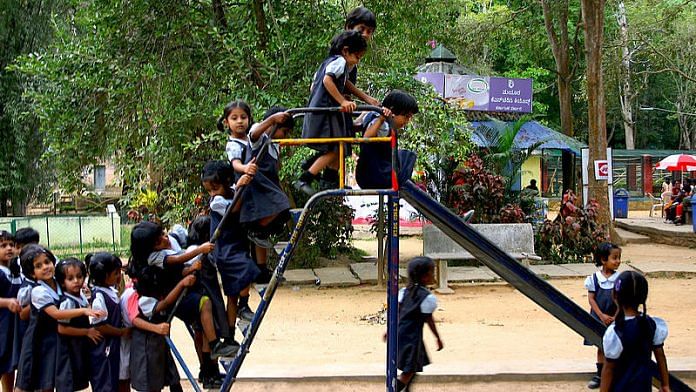New Delhi: The wall doesn’t exist for children, but it appears to be all too real for parents.
Children from poor families receiving fees-free education in Delhi schools face no discrimination from their richer peers, but are eyed with suspicion by the their parents, an ongoing study suggests.
The parents, the study adds, may not be too open to interaction between the two groups of students either.
Indus Action, an NGO that works with the central and state governments in the field of education, is studying interactions between students from the economically weaker section (EWS) and others to understand the social impact of the government-mandated quota for the poor in private schools.
For school admissions, EWS families are described as those with an annual income below a certain threshold (Rs 1 lakh to Rs 2 lakh). Under the Right to Education Act, 25 per cent of all seats in private schools are reserved for children from the EWS, who are also entitled to a free education.
The study, which has a small sample size, focuses on Classes 3, 4 and 5 in three Delhi private schools: One of them is a big school with high fees, the second is a relatively less expensive institute, while the third has low fees.
The social-inclusion study has been designed by alumni from the Harvard Graduate School of Education, US, and seeks to explore parameters such as friendship patterns among students via in-school and in-classroom observations — for example, how students interact in class and playtime.
The schools haven’t been identified as part of a privacy clause.
Also read: Good news for IAS aspirants — UPSC looks to fill 180 vacancies, incorporates EWS quota
‘Bad habits’
According to the initial findings of the study, some non-EWS parents said they were scared to let their children mingle with those from the EWS category because they feared they might pick up bad habits and language.
A few claimed they invited non-EWS children to birthday parties but the latter did not turn up.
“We found that EWS parents may not be as forthcoming due to socio-economic distance,” said Kritika Sangani of Indus Action, who is involved in the project.
“Some non-EWS parents wish to engage EWS parents and children and see the value of inclusive classrooms. However, they find themselves ill-equipped to enable such initiatives,” she added.
“We have also come across fee-paying [sic] parents who are averse to interactions between their children and EWS children as they fear that their children may pick up wrong habits, language etc,” Sangani added. “They also fear such interactions may lower the overall pace of learning in the classroom,” she said.
“However, these are just initial findings and not conclusive results as the study is still going on,” she added.
The final results of the study are likely to be compiled in a couple of months.
As for the dynamic among students, the study points out that schools put in a lot of effort to effect inclusion in the classroom, and notes that the discrimination observed transpired during lunch and playtime.
“The initial findings have shown no conspicuous patterns of discrimination against EWS children in classrooms,” said Sangani.
The insights gleaned from the study will be brought to the attention of schools, governments and academicians to trigger discourse and interventions. Another phase of the study is scheduled to be conducted in two other states.
Raising red flags
Talking to ThePrint, administrators at two Delhi schools said bringing together students from disparate backgrounds did present some challenges, with one admitting that parents often raised red flags.
Priyanka Gulati, the principal of Evergreen Senior Secondary School in Vasundhara Enclave, east Delhi, said that “as far as students are concerned, they are good with each other”.
“But,” she added, “parents have complained of issues in parent-teachers meetings. It’s mostly trivial, behavioural issues that they point out.”
Ashok Pandey, the principal of Ahlcon International School in Delhi’s Mayur Vihar area, said nurturing children was a demanding task irrespective of their background.
“Dealing with a child, working for the growth of a child is always challenging,” he added. “It does not matter what category the child belongs to. Children who show disinterest in studies can come from any background. As far as a child’s behaviour is concerned, you cannot attribute it to their background,” said Pandey.
“However, when children from different categories come together, it does take some time for them to adjust with each other,” he said. “And it’s very important that the environment is conducive to that. The school and teachers should be positive.”
Also read: Modi govt’s job quota for ‘weaker’ upper castes: Desperate poll sop or meeting aspirations?




With ref to quota for the marginalized children in private schools, the better and rewarding move would be to improve and use resources to improve public schools which have the good spacious classrooms,infrastructure etc
so the education level with supervision can be raised and parents don’t feel the need to enrol their children in private schools. Of course a feeling of inferiority complex will be there ,class distictions are so inhetent in our societies